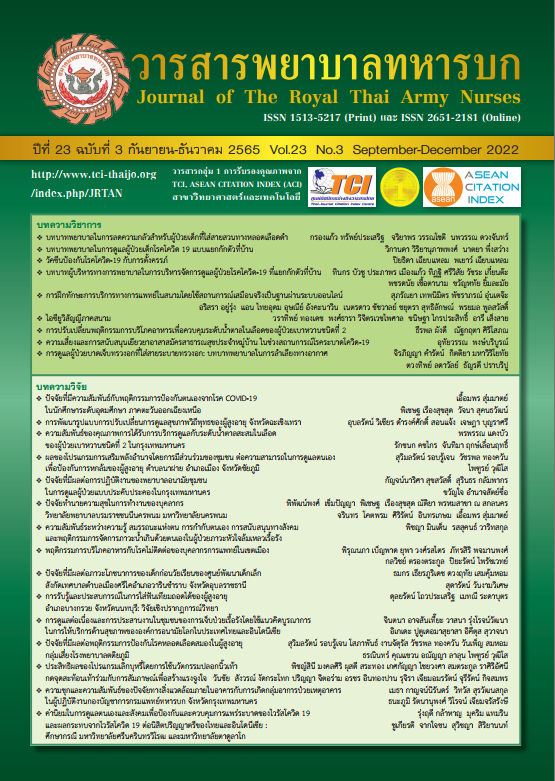The Effect of Resilience Enhancement Group Program on Depression of Schizophrenic Patients
Keywords:
Resilience Enhancement Group Program, Depression, Schizophrenic PatientsAbstract
The purposes of this quasi – experimental research were: 1) to compare depression of schizophrenic patients before and after received resilience enhancement group program, and 2) to compare depression of schizophrenic patients who received resilience enhancement group program and those who received regular nursing care. Forty samples were inpatients schizophrenic patients at Somdetchaopraya institute of psychiatry, 20 subjects were randomly assigned to experimental group and control group, who met the inclusion criteria. They were matched pair by gender, age, and psychiatric symptoms. The experimental group received resilience enhancement group program, and the control group received regular nursing care. Research instruments consisted; 1) The resilience enhancement group program, 2) Demographic questionnaire 3) The Thai version of Calgary Depression Scale for Schizophrenia (CDSS). All instruments were tested for content validity by 5 professional experts. The reliability of the 3rd instruments was reported by Cronbach’s Alpha coefficient of 0.85. Data were analyzed using descriptive statistics and t-test.
Major findings were as follows:
1) Depression of schizophrenic patients who received resilience enhancement group program was significantly lower than before, at the .05 level.
2) Depression of schizophrenic patients who received resilience enhancement group program were significantly lower than those who received regular nursing care, at the .05 level.
Conclusion: The result of this study support that the resilience enhancement group program can reduce the depression of schizophrenic patients.
Downloads
References
Upthegrove R., Marwaha S., and Birchwood M. Depression and schizophrenia: cause, consequence, or trans-diagnostic issue? Schizophrenia bulletin. 2017; 43(2): 240-244.
Moritz, S., et al. Course and determinants of self-esteem in people diagnosed with schizophrenia during psychiatric treatment. Psychosis. 2010; 2 (2): 144–153.
Ketchai S., Sitthimongkol Y., Vongsirimas N., and Petrasuwan S. Predictors of Depressive Symptoms in Individual with First–episode Schizophrenia. Journal of Nursing Science. 2012 ; 30(4): 90-101.(In Thai).
Phandontee P., and Dangdomyouth P. Selected factors related to depression of persons with schizophrenia in community, central region., Chulalongkorn University, Bangkok; 2011. (In Thai).
Gardsjord, E., et al. Subjective quality of life in first-episode psychosis. A ten year follow-up study. Schizophrenia Research. 2016; 172(1-3): 23-28.
Dutta, R., et al. Early risk factors for suicide in an epidemiological first episode psychosis cohort. Schizophrenia Research. 2011; 126(1-3): 11-19.
Lotrakul M. and Sukanich P. Psychiatry Ramathibodi. Bangkok : BeyondEnterprised Ltd; 2015. (In Thai).
Salasawadi P., Soontaradechakit R., Klancprapan P., and Suriyachai S. Effects of group supportive psychotherapy program on depression in patients with schizophrenia.The journal of psychiatric nursing and mental health. 2016; 30(3): 121-133. (In Thai).
Konsztowicz S., and Lepage M. The role of illness engulfment in the association between insight and depressive symptomatology in schizophrenia. Journal of psychiatric research. 2019 ; 111: 1-7.
Grotberg, E. H. A guide to promoting resilience in children: Strengthening the human spirit (No. 8). The Hague, Netherlands: Bernard van leer foundation; 1995.
Di Marco, S., et al. Schizophrenia and major depression: Resilience, coping styles, personality traits, self-esteem and quality of life. European Psychiatry.2017; 41: 192-193.
Rossi, A., et al. Personal resources and depression in schizophrenia: The role of self-esteem, resilience and internalized stigma. Psychiatry research. 2017; 256: 359-364.
Yalom, I. D. The Theory and Practice of Group Psychotherapy.4nd ed. NewYork: Basic Books; 1995.
Veselinova, C. HSC 3008: Implement therapeutic group activities. Nursing & Residential Care. 2013; 15(5): 284-287.
Suttajit S., Srisurapanont M., Pilakanta S., Charnsil C., and Suttajit S. Reliability and validity of the Thai version of the Calgary Depression Scale for Schizophrenia. Neuropsychiatric disease and treatment. 2013; 9: 113.
Department of Mental Health, Ministry of Public Health, Thailand. Change bad for good : The resilience (RQ : Resilience Quotient). Bangkok : Dee-na-doo; 2009. (In Thai).
Beck, A. T. (Ed.). Cognitive therapy of depression. Guilford press; 1979.
Krithong N. and Upsen R. The Effect of educative and supportive program on self-care behaviors of schizophrenic patients with negative symptoms in community. Journal of The Royal Thai Army Nurses. 2017; 18 : 308-314. (in Thai).
Majadas, S., Olivares, J., Galan, J., and Diez, T. Prevalence of depression and its relationship with other clinical characteristics in a sample of patients with stable schizophrenia. Comprehensive Psychiatry. 2012; 53(2): 145-151.
Hongtiyanon T. and Tipawong A. Relationships between social support and quality of life in schizophrenia patients. Journal of The Royal Thai Army Nurses. 2018; 18: 487-494. (in Thai).
Downloads
Published
How to Cite
Issue
Section
License
Copyright (c) 2023 Journal of The Royal Thai Army Nurses

This work is licensed under a Creative Commons Attribution-NonCommercial-NoDerivatives 4.0 International License.
บทความหรือข้อคิดเห็นใดใดที่ปรากฏในวารสารพยาบาลทหารบกเป็นวรรณกรรมของผู้เขียน ซึ่งบรรณาธิการหรือสมาคมพยาบาลทหารบก ไม่จำเป็นต้องเห็นด้วย
บทความที่ได้รับการตีพิมพ์เป็นลิขสิทธิ์ของวารสารพยาบาลทหารบก
The ideas and opinions expressed in the Journal of The Royal Thai Army Nurses are those of the authors and not necessarily those
of the editor or Royal Thai Army Nurses Association.






